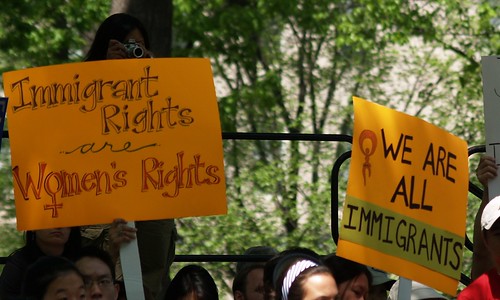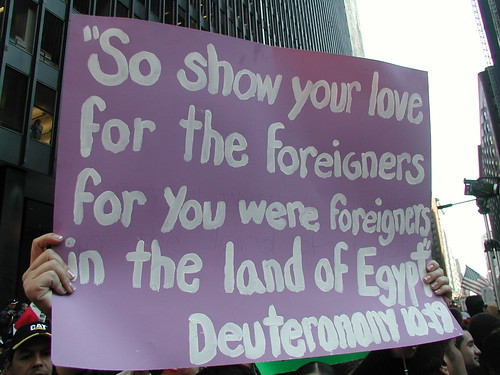Introduction
NB: I also find it very cool to be getting a guest post from an African living in the UK. The first of hopefully many.

Immigration Redefined
I am not crazy about television. However, I am of the viewpoint that with selective watching, the TV can be a mighty educational instrument. Do read on.
I recently watched a documentary series called “Immigration: The Inconvenient Truth”. Inspired by the 40th anniversary of a then British Member of Parliament Enoch Powell’s infamous Rivers of Blood speech, Rageh Omaar, renowned British journalist of Somali heritage, set out on a country-wide mission. Omaar’s task: investigative journalism leading to a balanced documentary that explores immigration today in jolly good old Great Britain, whilst out rightly examining Powell’s apocalyptic prophesies. In this regard, Omaar traversed the country and interviewed a range of British people in terms of ethnicity (white, black and Asian) and class. An overview by the broadcasters, Channel 4, is given here.
Excerpt of Powell’s Rivers of Blood speech that presumably set out to tap into his fellow politician’s latent fears:
As I look ahead, I am filled with foreboding; like the Roman, I seem to see “the River Tiber foaming with much blood.” That tragic and intractable phenomenon which we watch with horror on the other side of the Atlantic but which there is interwoven with the history and existence of the States itself, is coming upon us here by our own volition and our own neglect. Indeed, it has all but come. In numerical terms, it will be of American proportions long before the end of the century. Only resolute and urgent action will avert it even now.
(Full text and mp3 via Channel 4)

An intriguing observation made by Omaar was that despite the intangible nature of immigration in the 21st century, Eastern Europeans (the most recent additions to the European Union) have been vehemently labelled as the newcomers who have come to take the jobs of the British working class, whereas Western Europeans and Americans who move to the UK (London in particular, due to the floating of the London Stock Exchange) for career motivations or economic prospects remain unnoticed or perhaps more accurately, unquestioned. One can only conclude that the latter group are not perceived to be a threat. This is possibly because (a) they are generally highly skilled, therefore entering an already accepted highly competitive job market, (b) they blend in with more ease into a society with similar cultural values and modes of expression, (c) their patterns of migration are better understood by the British population which makes them appear to be less of a threat on their livelihood or (d) statistically they are largely white. But so are the Eastern Europeans. I don’t know, take your pick or better yet, enlighten me.
The label immigrant never sat well with me. I have always known I am here “for a while”, whatever that means. But exactly that is the crunks of it. For a while is fluid. Likewise, Omaar demonstrated that what was referred to as immigration 40 years ago is certainly not what it is the case today. The permanence in the concept of immigration back then no longer constitutes the definition of immigration today. People now live as global citizens, moving from one country to another, for a multitude of reasons, economic migration being only one of them.

London, a cosmopolitan hub and I daresay as culturally diverse as any city in the world will ever get, is home to just over 2 million immigrants. In a recent report entitled A Profile of Londoners by Country of Birth (pdf), The Mayor of London’s office estimated that in 2006 one-third of Londoners were born outside the UK. Notably, majority of these people were of working age (20 to 34 years). The key message from the TV series that is reiterated in this report is that immigration has changed its face, its characteristics and therefore the societal issues it elicits. Immigration is dynamic. Unlike the times when people came from the colonies of the Empire to settle down, people are now in a state of constant flux. They ebb and flow at the shores of this small island, some settling for months or years and others indefinitely. The question that now takes precedence is if government policy and to a less extent, the population’s attitude are reflective of this. In one example, Omaar interviewed British working class men who acknowledged the need for people to gain more skills if they were to keep up with the incoming flux of skilled manual workers. Preparation for survival of the fittest as it were.

So it’s official, the world’s borders are porous; home really is where the heart is. How does this apply to you, you might ask? Immigration in its new, updated definition is a worldly affair. No longer territory (pun fully intended) for the coloniser and the colonised, but simply for people from all walks of life, seeking better opportunities – economic, education or otherwise. With regards to the African Diaspora, the term and concept of the Afropolitan, coined by Taiye Tuakli-Wosornu readily comes to mind.
I leave you with my mantra:
Home is a state of mind. Having more than one home is not a bad thing at all. After all, home and home-home are two different things entirely.
By Sci-culturist,
From Sci-culturist
To listen and participate in more discussions on immigration, its benefits, its responsibilities and its consequences, make sure you are subscribed to the website for free via RSS or email.














